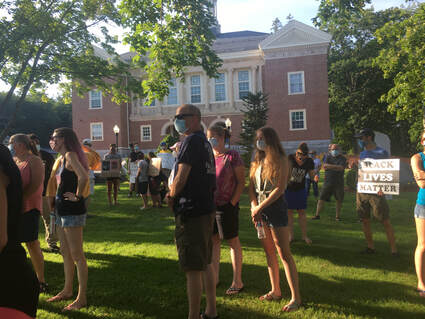
In Isaiah 58:6 God speaks
“Is not this the fast that I choose:
to loose the bonds of injustice,
to undo the thongs of the yoke,
to let the oppressed go free,
and to break every yoke?
Jesus quotes this in Luke 4:18-20
“The Spirit of the Lord is on me,
because he has anointed me
to proclaim good news to the poor.
He has sent me to proclaim freedom for the prisoners
and recovery of sight for the blind, to set the oppressed free,
to proclaim the year of the Lord’s favor.”
Among the many fundamentals to the Christian faith are two ideas--one that God's rule was begun with Jesus's life here on earth, and secondly that we are called to proclaim good news to the poor and to set the oppressed free.
Jesus, a brown, Jewish man, learned this from the Jewish scriptures.
It doesn't feel much like the kingdom of God, this time we are living in now. It doesn't feel much like the oppressed have been set free. With the death of George Floyd--after many deaths that were not enough to make us all rise up--with the death of George Floyd we are faced with the tragedy of our nation. Our nation was created with the idea that all of us are created equal, that all of us can pursue life, liberty, and happiness, that together we can make decisions about our common life in a democratic process. Today, as patriots of this nation, we are called together to help our nation be more explicit about what we mean by ALL.
We make ALL lives matter by naming explicitly that queer lives matter.
We make ALL lives matter by naming explicitly that trans lives matter.
We make ALL lives matter by naming explicitly that women's lives matter.
We make ALL lives matter by naming explicitly that disabled lives matter.
We make ALL lives matter by naming explicitly that immigrant lives matter.
We make ALL lives matter by naming explicitly that Muslim and Jewish lives matter.
Today we proclaim explicitly that Black Lives Matter.
It is easy to get caught up in the individual nature of the deaths we have seen. We are angry at particular cops that have killed particular men, women, and children. We are angry at particular politicians that block action on particular bills.
Yet any one of us, with a gun, in a difficult situation, might find our internalized biases driving our actions. Anyone of us, without a gun, certainly have found ourselves acting with less kindness and compassion than we want to share. When Isaiah predicts the release of the captives he is not arguing for a list of particular people to be granted clemency. Isaiah shows us God is speaking to the nation, God is demanding a national response.
At the same time, we cannot create a culture of caring for the oppressed by being hateful to those who refuse to understand. Those of us who are white here today must find a way to communicate with other white people the importance of this work. Do not allow your passion to turn into hatred.
We must continue to love and support individual police officers as we demand that the system for policing changes.
We must continue to love and support teachers and administration in our local schools as we demand that oppressive curricula are changed.
We must continue to love and support elected officials as we demand structural changes to our laws.
Racism is part of our culture. Racism is something that we have caught from society more than something we were taught by our parents or our schools. We must love and support people who are afraid of the changes that we are calling for, as we reach across differences, speak lovingly, while insisting that we find ways fight the oppressive ways we have learned.
The goal of the day of the Lord, of the Kingdom of God, the goal of a free nation is to overcome all oppression, that we will end laws and customs promote racism, classism, sexism, ableism, homophobia, and more.
We are gathered here to start on that work. Many of us have done much work before, some of us are new to these ideas, but all of us are at the start of this newest effort to make our town, our state, our nation the best that it can be.
It is our patriotism that brings us here, it is our faith that brings us here, it is our hearts that bring us here to this space declaring that for now on, in every way we can, we will declare that Black Lives Matter and that the oppressed must be set free.
Please join me in prayer: Holy God of many names, be with us in the work. Keep us strong against the powers that want to stay the same, and keep us loving against the powers that want us to hate. Amen.
 RSS Feed
RSS Feed
